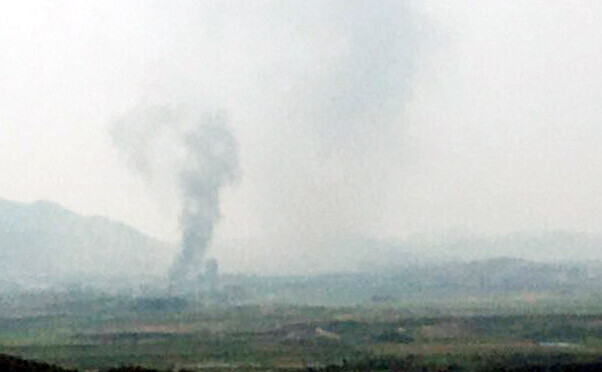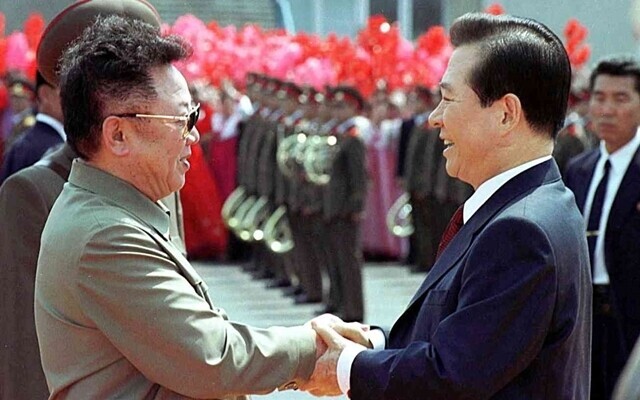hankyoreh
Links to other country sites 다른 나라 사이트 링크
[Editorial] Both South and North Korea need to take bold, resolute steps toward dialogue

The 20th anniversary of the June 15 South-North Joint Declaration of 2000 arrived at a time when tensions have been mounting on the Korean Peninsula. North Korea did not hold any commemorative events or issue any related statements that day.
In opening remarks at a meeting of senior secretaries and aides at the Blue House that day, South Korean President Moon Jae-in stressed, “The more difficulties we see as the situation in inter-Korean relations becomes more serious, the more we need to reflect on the spirit and achievements of the June 15 Declaration.” Describing both the Apr. 27 Panmunjom Declaration and the Sept. 15 Pyongyang Joint Declaration of 2018 as “solemn promises that South and North alike must faithfully honor,” he emphasized the “ironclad principle of not allowing this to be undermined by any changes in the political situation.”
In remarks directed at North Korea, Moon said, “We must not seek to cut off communication, raise tensions, and return to the past era of confrontation.” He also expressed his “hope that we can resolve the uncomfortable and difficult issues that South and North face through communication and cooperation.”
In terms of the history of Korea’s division, the June 15 Joint Declaration marks a turning point and dividing line between an era of antagonism and distrust and one of reconciliation and cooperation. The declaration is both a milestone and a compass for inter-Korean relations as agreed upon by Seoul and Pyongyang. To keep South and North from losing their way amid the crisis, we need to return to the June 15 spirit. Our two sides must respect each other and engage in dialogue.

The conservative media and political opposition are calling for a hardline response toward Pyongyang. But as we saw under the Lee Myung-bak and Park Geun-hye administration, the situation only gets worse when the two sides start trying to match each other blow for blow. The first thing we need to do is manage the situation with a firm response to the launches of propaganda balloons as we explore what our next step should be. In a dialogue held at the National Assembly that day to mark the June 15 Joint Declaration’s 20th anniversary, Special Presidential Advisor for Unification, Foreign Affairs and National Security Moon Chung-in, National Unification Advisory Council (NAUC) Executive Vice Chair Jeong Se-hyun, and Sejong Institute Senior Research Fellow Lee Jong-seok, also a former unification minister, argued that the first step in extricating ourselves from the crisis should be to begin procedures to enact a law banning balloon launches as quickly as possible.
Looking at the process from which the June 15 Joint Declaration emerged, we can see that is a matter of making peace. On June 15, 1999 -- one year to the day before the declaration -- the South and North Korean navies had a battle in the waters near Yeonpyeong Island. Up until the moment of then President Kim Dae-jung’s arrival at Pyongyang’s Sunan International Airport for the inter-Korean summit in June 2000, it was still unclear whether North Korean leader Kim Jong-il would come to the airport to greet him.
President Moon emphasized that this is a “time when we can’t simply wait for conditions to improve.” He went on to voice his hope to “actively find and implement projects that South and North can decide and pursue together as masters of the Korean Peninsula’s destiny.” Recently proposed ideas have included holding a “one-point summit” with the North, as Moon Chung-in suggested, or sending a special envoy to North Korea to explore solutions, as Dankook University chair professor Park Jie-won, former presidential chief of staff, advised. This is a moment that calls for boldness and resolution.
By Please direct comments or questions to [english@hani.co.kr]

Editorial・opinion
![[Column] Season 2 of special prosecutor probe may be coming to Korea soon [Column] Season 2 of special prosecutor probe may be coming to Korea soon](https://flexible.img.hani.co.kr/flexible/normal/500/300/imgdb/original/2024/0426/3317141030699447.jpg) [Column] Season 2 of special prosecutor probe may be coming to Korea soon
[Column] Season 2 of special prosecutor probe may be coming to Korea soon![[Column] Park Geun-hye déjà vu in Yoon Suk-yeol [Column] Park Geun-hye déjà vu in Yoon Suk-yeol](https://flexible.img.hani.co.kr/flexible/normal/500/300/imgdb/original/2024/0424/651713945113788.jpg) [Column] Park Geun-hye déjà vu in Yoon Suk-yeol
[Column] Park Geun-hye déjà vu in Yoon Suk-yeol- [Editorial] New weight of N. Korea’s nuclear threats makes dialogue all the more urgent
- [Guest essay] The real reason Korea’s new right wants to dub Rhee a founding father
- [Column] ‘Choson’: Is it time we start referring to N. Korea in its own terms?
- [Editorial] Japan’s rewriting of history with Korea has gone too far
- [Column] The president’s questionable capacity for dialogue
- [Column] Are chaebol firms just pizza pies for families to divvy up as they please?
- [Column] Has Korea, too, crossed the Rubicon on China?
- [Correspondent’s column] In Japan’s alliance with US, echoes of its past alliances with UK
Most viewed articles
- 1AI is catching up with humans at a ‘shocking’ rate
- 2Korea’s 1.3% growth in Q1 signals ‘textbook’ return to growth, says government
- 3No good, very bad game for Korea puts it out of Olympics for first time since 1988
- 4[Column] Park Geun-hye déjà vu in Yoon Suk-yeol
- 5[Column] Season 2 of special prosecutor probe may be coming to Korea soon
- 6Division commander ordered troops to enter raging flood waters before Marine died, survivor says
- 7Is Japan about to snatch control of Line messenger from Korea’s Naver?
- 8After election rout, Yoon’s left with 3 choices for dealing with the opposition
- 9Will NewJeans end up collateral damage in internal feud at K-pop juggernaut Hybe?
- 10Marriages nosedived 40% over last 10 years in Korea, a factor in low birth rate